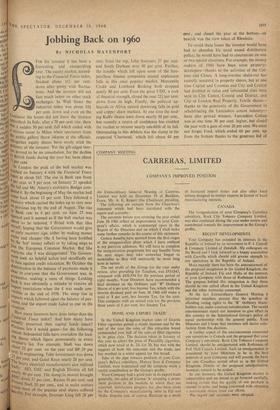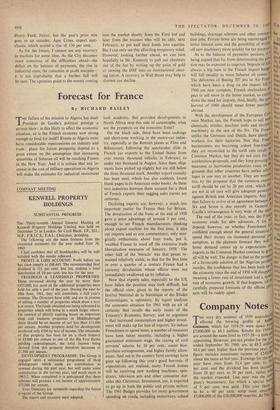Jobbing Back on 1960
DAYEN.PORT
By NICHOLAS
FOR the investor it has been a frustrating and exasperating year. The equity market, accord- ing to the Financial Times index, finished about I IJ per cent. down after pretty wide fluctua- tions. And the investor did not fare much better on other stock exchanges. In Wall Street the industrial index was about 101 niUn Per cent. to 5 per cent. on January 21 speeded le a(Ipej icerb"i is keel per cent, down and even on the Continent the boom did not leave the investor unscathed. In Italy, after a 70 per cent. rise, there was a sudden 30 per cent. fall which ended with a riotous scene in Milan when spectators from the public gallery threw inkpots at the officials. Altogether equity shares have sorely tried the ?otfence of the investor. Yet the gilt-edged mar- ),`et proved to be no consolation, for the decline In British funds during the year has been about
• Per cent.
In London the peak of the bull market was r.eaehed on January 4 with the Financial Times lildex at about 343. The rise in Bank rate from .e fall and Mr. Amory's restrictive Budget com- 13leted it. By the beginning of May the market had conic back about 13 per cent. Then followed a r.ecovery which carried the index up to very near I:ts Previous top by the end of August. The rise 111 Bank rate to 6 per cent. on June 23 was a ell' r jg11°red and it seemed as if the bull market was ituutif to be restored. I flirted with that idea illYself, hoping that the Government would give 411 early recovery sign, either by making money
easier and cheaper (the having been fortified
the 'hot' money influx) or by taking steps to °In the European Common Market. But like everYone else I was disappointed. The Govern- n.lent took no helpful action and steadfastly set its face against credit relaxation. By October the deterioration in the balance of payments made it Clear to everyone that the Government was, in ecnnomics, making a mess of things. Looking back it was obviously a mistake to remove all 'ninon restrictions when the £ was made con- vertible at the end of 1958. The steep rise in "Ports which followed upset the balance of pay- II'lents and the export trade failed to rise to the c)ecasion.
1. How many investors have done better than the .inancial Times index? And how many have acoi‘ a,ctilallY preserved their capital funds intact? i .iecious few I would guess—for the following :eds011. Substantial falls have overtaken the lead- Shares which figure prominently in every '4vestor's list. For example, Shell was down 1bout 22 per cent, on the year and BP 29 per In engineering, Tube Investments was down Per cent. and Guest Keen nearly 20 per cent. b‘aie, heavy electrical manufacturers also suffered kiLY AEI, GEC and English Electric all fell illemarlY 40 per cent. The slump in motors brought p C down 37 per cent., Rootes 38 per cent. and ‘‘ressed Steel 38 per cent., and to make matters ,b.c/rse most of the popular steel shares suffered e4vilY. For example, Dorman Long fell 28 per cent, from the top, John Summers 27 per cent. and South Durham over 40 per cent. Further, the trouble which fell upon some of the hire- purchase finance companies caused unpleasant falls in this once popular market. Mercantile Credit and Lombard Banking both dropped nearly 50 per cent. Even the great UDT, a rock of financial strength, closed the year 221 per cent. down from its high. Finally, the political up- heavals in Africa caused shattering falls in gold and copper share markets. At one time the lead- ing Kaffir shares were down nearly 50 per cent., but recently a return of confidence has enabled the market to recover nearly one-fifth of its fall. Outstanding in this ddbacle was the slump in the respected 'Chartered,' which fell about 44 per
cent., and closed the year at the bottom—so bearish was the view taken of Rhodesia.
To avoid these losses the investor would have had to abandon his usual sound distribution policy; he would have had to cbncentrate on one or two special situations. For example, the money makers of 1960 have been some property- developers—thanks to the activities of the Cot- tons and Clorcs. A long-overdue shake-out has recently occurred in property shares, but at one time Capital and Counties and City and Central had doubled in value and substantial rises were seen in City Centre, Central and District, and City of London Real Property. Textile shares— thanks to the generosity of the Government in rehabilitating the Lancashire cotton industry— have also proved winners. Lancashire Cotton was at one time 30 per cent. higher, but closed the year with a gain of over 20 per cent. We must not forget Ford. which ended 60 per cent. up from the bottom thanks to the generous bid of Henry Ford, Junior, but the year's prize win goes to an outsider, Agar Cross, export mer- chants, which scored a rise of 136 per cent.
As for the future, I cannot see any recovery in markets for some time. As the City becomes more conscious of the difficulties ahead—the deficit on the balance of payments, the rise in industrial costs, the reduction in profit margins— it is not improbable that a further fall will be seen. The optimists point to the money coming into the market shortly from the Ford bid and later from the trustees who will be able, next February, to put half their funds into equities. But I can only see this affording temporary relief. However, looking further ahead, we can turn hopefully to Mr. Kennedy to pull our chestnuts out of the fire by writing up the price of gold or turning the IMF into an international clear- ing union. A recovery in Wall Street may help to shorten our decline.



































 Previous page
Previous page